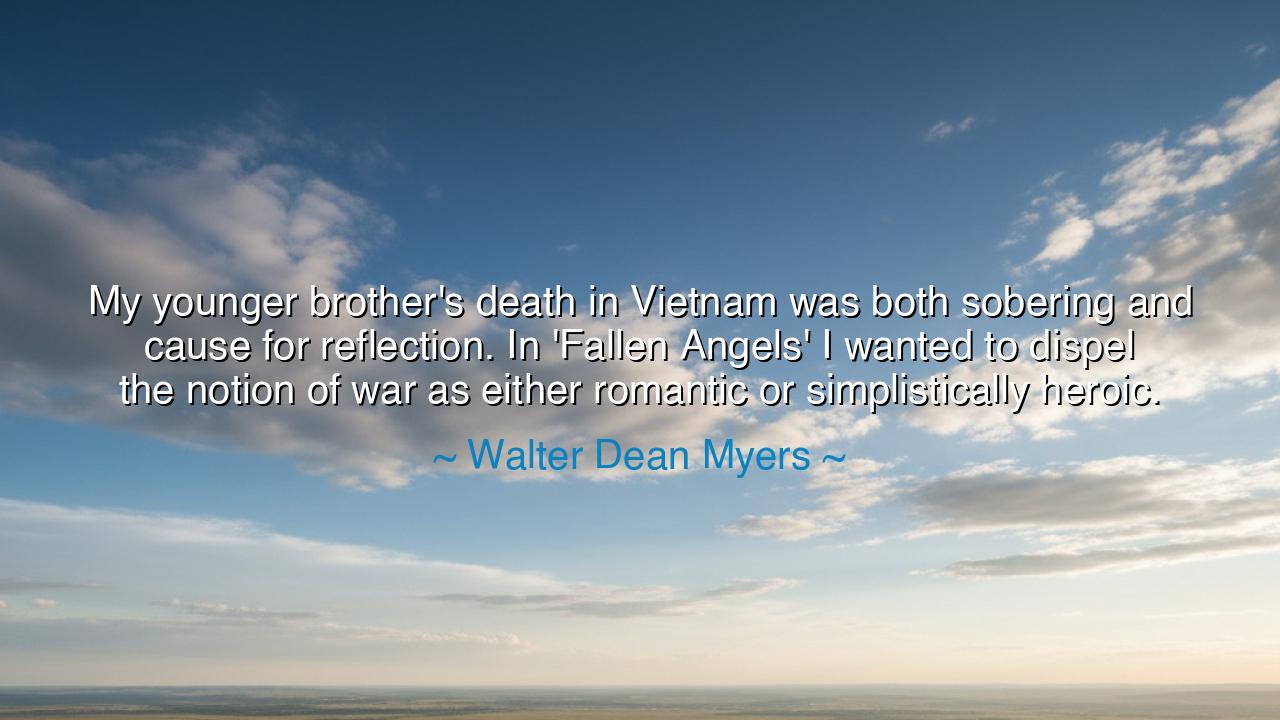
My younger brother's death in Vietnam was both sobering and cause
My younger brother's death in Vietnam was both sobering and cause for reflection. In 'Fallen Angels' I wanted to dispel the notion of war as either romantic or simplistically heroic.






"My younger brother's death in Vietnam was both sobering and cause for reflection. In 'Fallen Angels' I wanted to dispel the notion of war as either romantic or simplistically heroic." – Walter Dean Myers. These words resonate with the weight of personal loss and the harsh realities of war. Myers, drawing from his own deep sorrow over the death of his younger brother in Vietnam, uses his writing not only to grieve but also to redefine the very nature of war. In Fallen Angels, he sought to break free from the popular narratives that depict war as a romanticized, glorious endeavor where young men are celebrated as heroes. Instead, he offers a sobering and realistic portrayal of the brutal, dehumanizing aspects of combat—a place where the loss of innocence and the anguish of soldiers is far more complex than the simplicity of heroism.
In the ancient world, war was often portrayed in grand, heroic terms. The Iliad, written by Homer, is perhaps the most famous example of the romanticization of battle. It celebrates the valiant warriors like Achilles, whose valor and strength are the stuff of legends. However, even in this epic, Homer does not shy away from the suffering and tragedy that war brings. Achilles’ rage, driven by personal loss and frustration, ultimately leads to his destruction, highlighting that war, though filled with heroic deeds, is equally a force of devastation. Myers, like Homer, taps into this tension—the romantic heroism of battle intertwined with the harrowing cost it inflicts on the souls of those who experience it.
The Vietnam War, in which Myers’ brother perished, was itself a conflict that was often viewed through the lens of national pride and patriotism, but it also became a symbol of the tragic disillusionment that followed. Much like the ancient stories of tragic heroes, soldiers in Vietnam were often sent to fight for ideals that they didn’t fully understand, only to return broken, disillusioned, or, in many cases, never to return at all. The Vietnam War, like the wars of antiquity, was portrayed by many as a noble cause, but the experiences of the soldiers—facing death, moral ambiguity, and psychological trauma—were far from the romanticized vision sold to the public. Myers sought to show this truth in Fallen Angels, aiming to challenge the narrative of simplistic heroism that often surrounds war.
The lesson here is a powerful one: war is not simply a battle between good and evil or a place where men become heroes through valorous deeds. It is a devastating force, one that exacts a heavy price on those who are caught in its grip, both physically and emotionally. The heroes of war, like those in Homer’s tales or the soldiers in Vietnam, are often flawed, broken, and haunted by their experiences. Their bravery is not in the absence of fear or suffering, but in the way they endure despite it. By writing Fallen Angels, Myers not only honors the memory of his brother but also provides an unflinching portrayal of the reality of war, showing that heroism in battle often comes at the cost of innocence, humanity, and the soul.
Consider the story of the Spartan warrior Leonidas, who led his 300 soldiers to a heroic death at the Battle of Thermopylae. While the story of their stand is one of incredible courage and bravery, it also reveals the tragic reality of war—the soldiers knew they would likely perish, but they chose to fight anyway, driven by duty, loyalty, and the belief that their sacrifice would secure freedom for others. Leonidas’ heroism, like that of many ancient warriors, was honorable, but it was also tragic, as the cost of their heroism was the loss of their lives and their loved ones. War, while it may bring out moments of greatness, also reveals the costly nature of that greatness.
Myers' reflection on his brother's death is an invitation to question and reconsider the way we view war in our modern world. It is easy to be swept up in the idealized versions of soldiers as heroes, but we must also recognize the pain and trauma that they endure. The romantic view of war may inspire patriotism, but it must also be balanced with an honest understanding of the suffering it causes. The soldiers who fight are not simply instruments of glory, but human beings—complex, vulnerable, and subject to the deepest emotional and physical costs of combat.
In our own lives, the lesson we should take away from Myers’ words is the importance of honoring the truth—especially when it is difficult. Whether it is in the stories we tell about history, war, or personal loss, we must strive to acknowledge the complexity and darkness that are part of the human experience. We must resist the temptation to simplify or romanticize difficult truths, and instead, embrace the full, unflinching reality of our shared human journey. By doing so, we not only honor those who have sacrificed but also create space for growth, healing, and understanding in the face of the challenges that life throws our way.
As we navigate our own lives, let us remember that the heroic moments we encounter are not without their shadows. To live fully is to confront both the light and the darkness—to see the romanticism of our dreams and ambitions but also to acknowledge the sacrifice and suffering that are often intertwined with them. Like Myers, let us use our voices—whether through art, writing, or conversation—to speak truthfully, honoring the memory of those who have come before us and ensuring that we build a future based on understanding and compassion.






AAdministratorAdministrator
Welcome, honored guests. Please leave a comment, we will respond soon